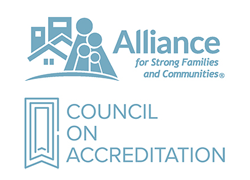News
Building a New Organization: Reflections on the First Thirty Days
A big thank you to Jody, our President & CEO, for this blog post.
After a successful due diligence process and Board and Member vote to merge, on January 1, 2021, the Alliance for Strong Families and Communities (Alliance) and the Council on Accreditation (COA) began its work to integrate operations and build a new organization. As the inaugural leader of the new organization, I know that there is a lot to consider and to do.
Our new organization is intended to be something distinctive, something different. While it will blend the assets of both the Alliance and COA, our intent is not to simply be “Alliance + COA.” Our intent is to spark a current in the social sector—to create a dynamic, inclusive, multifaceted network that leverages the collective experience of the field, research, and each of the legacy organizations. As a new organization, we believe we can activate the power of the social sector and offer novel tools and resources to solve the social problems that plague communities and our nation.
As I said in my prior blog post on leading change, “Change is a collaborative process. Incumbent upon the authorized or designated leader of change is to inspire those around them and to make space for change to occur.” Our first 30 days of operating together has repeatedly shown me the accuracy of those words. To create this new organization, we will need to engage all our staff, their various skills and talents, and our entire network and their insights and perspectives. We will also need patience.
What we are experiencing as we undertake this merger is really what leaders experience every day. We are operating on parallel paths, engaging in a concurrent process of operating, learning, and creating. Over the past month, as I have dug deeper into learning mode, I have once again been reminded that amid change there are more questions than answers. That is uncomfortable space for me, and I think it probably is for many of us.
As much as we all like to think of ourselves as being able to live in the gray, to tolerate ambiguity, it doesn’t come easily. It would be easier to start throwing out fixes and solutions that would cross things off the list and put people at ease by providing clarity–even if they didn’t like the answers. I go back to my clinical days though and think about all that I learned from families. Initially, it seemed far easier to try to solve the challenges families faced by throwing services at them after making assumptions instead of really learning about their needs – from their perspective. What I learned was that to do it right (or at least better), it took time and it took the building of a relationship. And in the context of that relationship over time, a true (and more accurate) sense of the right solutions emerged. These were informed by multiple perspectives and multiple sources of information, co-created. That is who we aspire to be as we move forward–unifying and purposeful; an organization that creates intrepid opportunities to disrupt the status quo and leads to more just and equitable outcomes.
As I reflect on our first thirty days of operating together, instead of being unnerved by the growing list of questions, I am learning to be energized. I am also learning to be comforted by the fact that we have a vast network of staff and of supporters that will chime in to create the answers. With patience, and the reliance on the voices of many, our new organization will have an impact. I look forward to engaging with everyone to craft our new answers and way forward.



